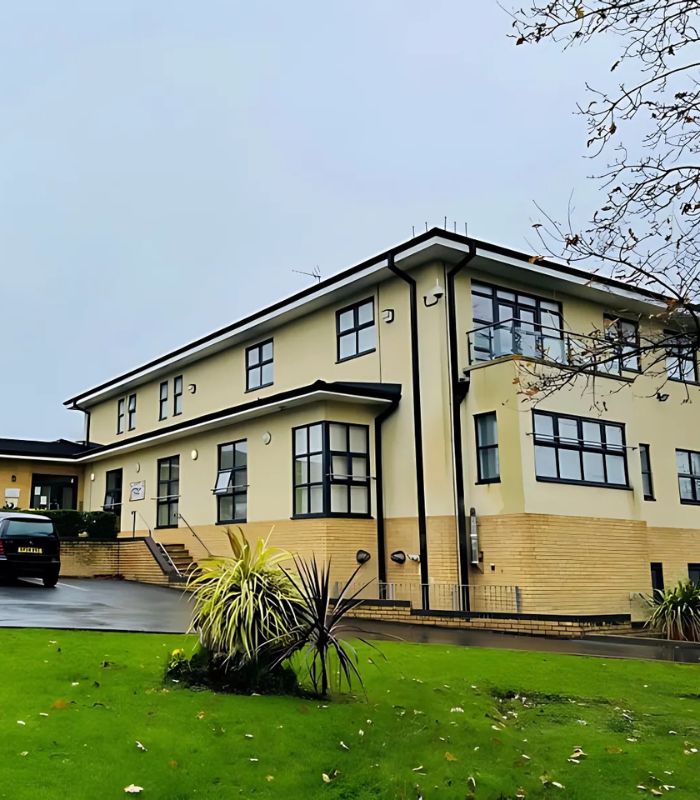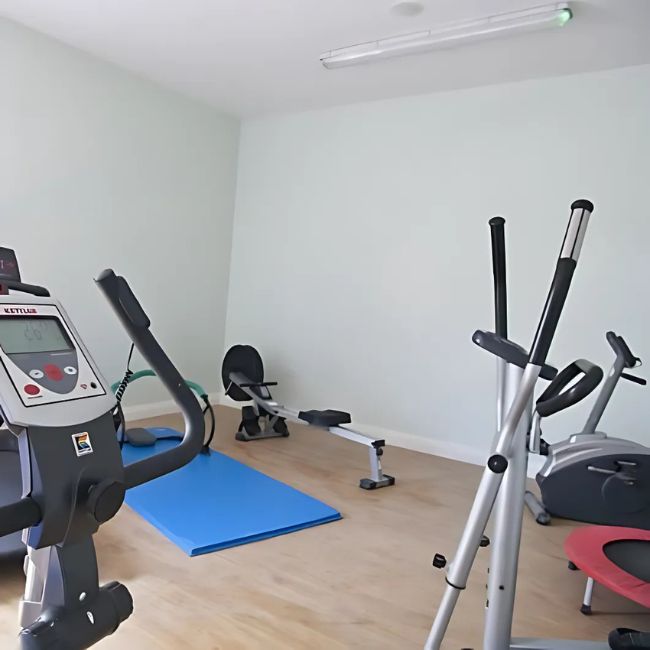Waterloo Manor Hospital
Waterloo Manor Hospital
Waterloo Manor Hospital stands as a leading provider of specialised services for women with complex mental health issues, offering an integrated care pathway from low secure environments to open rehabilitation settings. Through robust multi-disciplinary collaboration, a strong focus on personal recovery, and carefully designed facilities, we enable each individual to make meaningful steps towards improved mental health and functional independence.
The hospital is nestled amidst spacious grounds on the outskirts of Garforth, as a beacon of hope and recovery for women with complex mental health issues. Conveniently located within easy reach of Leeds city centre and served by Garforth Train Station—with direct links to Blackpool, Preston, Blackburn, Burnley, Manchester, York, Leeds, Huddersfield, Bradford, Halifax, and Hebden Bridge—Waterloo Manor is uniquely positioned to provide comprehensive and person-centred care. Benefitting from excellent accessibility via both the M1 from the south and the M62 to the east and west, we ensure that families, carers, and professionals can visit with ease, maintaining essential connections that support our patients on their journey to wellbeing.
Waterloo Manor has undergone an extensive refurbishment in recent years, transforming many of the wards and communal areas into bright and contemporary living and treatment spaces. The result is an environment that is carefully designed to encourage therapeutic engagement, emotional stability, and personal growth. Set within large, landscaped gardens, our hospital offers patients ample space to enjoy the outdoors, take part in physical activities, and cultivate social relationships—often crucial elements of a comprehensive recovery plan.

A Specialist Women’s Service
Waterloo Manor is the largest female Personality Disorder service in the United Kingdom providing assessment and treatment for women with complex mental health needs. Specifically focused on meeting the often multifaceted requirements of female patients, we have cultivated a culture that recognises the unique challenges they may face. Whether a woman arrives with a primary diagnosis of a personality disorder, mental illness, or co-morbid learning disabilities, our diverse and multidisciplinary team offers holistic care rooted in evidence-based best practices and person-centred principles.
Our ethos rests on the belief that every patient deserves a tailored care plan, which accounts for her individual history, personal goals, and specific therapeutic needs. We understand that personality disorders, in particular, can require a more nuanced approach, involving structured psychological interventions, therapeutic community participation, and carefully considered risk management strategies. Consequently, each ward at Waterloo Manor is staffed by a dedicated, highly trained team of psychiatrists, psychologists, nurses, occupational therapists, social workers, and support staff committed to delivering targeted and empathic care.
Low Secure Services: Maple Ward
Within our Low Secure services, we work with women presenting a range of mental health needs and challenging behaviours, often stemming from complex personality disorders or mental illnesses. Maple Ward provides low secure assessment and stabilisation for up to 16 women with complex needs, primarily those with a Personality Disorder diagnosis and/or co-morbid conditions. Here, the environment is specifically designed to ensure safety, structure, and therapeutic engagement, whilst maintaining a warm, welcoming atmosphere.
Our aim is to foster growth and healing by blending robust security measures with compassionate care. Maple Ward offers patients consistent staff support in a secure environment that respects the rights, dignity, and aspirations of each individual. The ward’s structured yet flexible framework helps service users manage symptoms, overcome behavioural difficulties, and develop coping strategies for the future. Through evidence-based therapeutic approaches, including Dialectical Behaviour Therapy (DBT) and Cognitive Behavioural Therapy (CBT), we support each service user in addressing her underlying issues, building self-esteem, and fostering long-term resilience.

High Dependency Mental Health Pathway
At Waterloo Manor, we recognise that some individuals may require a higher level of care than an acute ward can typically offer yet may not meet the threshold for a Psychiatric Intensive Care Unit (PICU). For such patients, our High Dependency Mental Health Pathway provides a carefully calibrated environment that bridges this gap. Our overarching goal is to ensure that service users receive the exact level of support and therapeutic input they require—neither more nor less—to achieve optimal outcomes.
This service model creates a more fluid journey between various levels of care, including acute, high dependency, PICU, and ultimately community discharge. By avoiding abrupt or poorly managed transitions, we increase the likelihood of sustained engagement in treatment and reduce the risk of relapse. Patients within the high dependency programme benefit from a multi-disciplinary approach that involves close psychiatric supervision, 24-hour nursing care, individual and group therapies, and personalised relapse prevention plans.
Psychiatric Intensive Care: Cedar Ward
Cedar Ward offers specialised Psychiatric Intensive Care (PICU) for women experiencing a severe deterioration in mental health that cannot be safely managed in a standard acute setting. Patients may be newly admitted with an acute crisis or have a significant exacerbation of an existing mental health condition. The emphasis in Cedar Ward is on active engagement and treatment, ensuring that individuals receive the intensive support and structure they need to stabilise swiftly.
Here, therapeutic interventions are tailored to the pressing needs of the individual. Through rigorous assessments, risk management, and the involvement of a broad range of professionals, the ward team ensures an optimised and person-centred approach. Service users are encouraged to participate in decision-making, co-producing their care plans to reflect personal goals and real-life aspirations. By involving patients in every step of their care, Cedar Ward fosters a sense of ownership, autonomy, and empowerment, often crucial in catalysing positive change.
Low Secure Facilities at Waterloo Manor
We have taken great care in designing the physical environment to promote both safety and comfort, recognising the significant role surroundings can play in recovery. Patients in our Low Secure service benefit from:
- Large Communal Areas: Spacious and inviting lounges encourage social interaction, community meetings, and the sharing of experiences. By building a supportive community, many patients find solace, empathy, and motivation in relating to peers facing similar challenges.
- En-suite Wet Rooms: Each bedroom features a modern, en-suite wet room to promote dignity, privacy, and infection control. Comfort and respect remain central to our approach, ensuring each patient feels valued and secure in her personal space.
- Integrated Audio Systems: Thoughtfully designed ward environments that can accommodate personal music or other therapeutic audio aids, creating a calming atmosphere tailored to individual needs.
- Hair Salon and Nail Bar: We believe that dignity and self-esteem are woven into daily life. Access to a hair salon and nail bar on-site can be an uplifting experience, helping service users maintain a sense of personal identity and self-care.
- Meeting and Therapy Rooms: Well-equipped spaces for one-to-one therapy, group sessions, and clinical meetings ensure privacy and professionalism. These rooms facilitate focused therapeutic work, including psychology sessions, occupational therapy, and family visits.
- Communal Gym: Physical health is an indispensable component of emotional wellbeing. Our on-site gym encourages physical fitness and the development of healthy habits, which can have a positive impact on mental health.
- Cinema: An innovative space where patients can watch films, documentaries, or therapeutic videos in a relaxed environment, enhancing social interaction, leisure skills, and community bonding.
Level 2 High Support Rehabilitation Services
Complementing our secure services, Waterloo Manor also offers Level 2 High Support Rehabilitation. This stream of care is designed for women who are transitioning away from higher levels of security but still require considerable support to advance their recovery journeys. With large communal areas, multiple dining and recreational rooms, rehabilitation kitchenettes, patient laundry facilities, and a combination of large single occupancy bedrooms or semi-independent apartments with en-suite facilities, this environment offers an exceptional standard of comfort and functionality.
We recognise that rehabilitation is not merely about managing symptoms; it is also about relearning or acquiring key life skills and enhancing autonomy. Whether cooking a meal, managing personal finances, or maintaining one’s living space, these crucial tasks help patients reintegrate into the community with greater confidence. Our dedicated occupational therapists and support staff guide service users through structured programmes designed to prepare them for more independent living.
Within this high support rehabilitation framework, Waterloo Manor operates four distinctive wards: Larch, Hazel, Lilac, and Holly. Each ward caters to specific patient needs, ensuring that a woman’s journey through the care pathway is seamlessly individualised, effective, and empowering.
1. Larch Ward
Larch Ward is designed for service users who require a more supportive environment than mainstream rehabilitation wards can typically offer. With a smaller number of service users and a higher staffing ratio, Larch Ward ensures each patient receives focused attention and care. Here, the therapeutic milieu emphasises structured daily routines, skill-building activities, and a clear pathway for stepping down to a less restrictive environment when the individual is ready.
Larch is ideal for women who may be in the earlier stages of rehabilitation, perhaps stepping down from our Low Secure service or needing extra help in stabilising their day-to-day routines. The ward fosters a strong sense of community, inviting patients to take part in communal decision-making, peer support groups, and holistic therapies that nurture self-esteem, agency, and motivation.
2. Hazel Ward
Hazel Ward provides High Support Rehabilitation for women presenting with personality disorders, complex mental illnesses, or co-morbid conditions. These patients may have transitioned from a Low Secure unit or been admitted from external services seeking a more structured environment with a robust therapeutic framework.
A key aspect of Hazel Ward is its ability to tailor interventions to a variety of presentations. Patients might require intensive psychological therapies focused on emotional regulation or interpersonal functioning, alongside medication management and occupational therapy. The integrated approach ensures that no aspect of an individual’s experience is overlooked. By balancing autonomy with appropriate risk management, the Hazel Ward team encourages incremental progress, aiming to help each patient regain confidence and independence at a pace suited to her unique circumstances.
3. Lilac Ward
Lilac Ward serves as an Open Rehabilitation Unit for women who no longer require the restrictions of a High Support Rehabilitation environment. By adopting an ‘open door policy’ and working towards semi-independent living arrangements, Lilac fosters greater self-determination, encouraging service users to take on more personal responsibility.
This environment supports individuals in honing the practical life skills they need to thrive outside the hospital setting. Whether it is cooking for themselves, attending community groups, or managing a personal schedule, service users learn to negotiate everyday tasks within a supportive but less controlled atmosphere. This transitional phase is often crucial in consolidating gains, promoting lasting independence, and reducing the risk of readmission.
4. Holly
Holly is currently being developed as a community house setting, expanding our capacity to promote real-world living experiences before final discharge. By mirroring a typical home environment, Holly will allow service users to practice coping strategies and daily routines in a familiar context, bridging the gap between institutional care and full community integration.
Rehabilitation Facilities
Patients within the High Support Rehabilitation pathway have access to a range of state-of-the-art facilities, including:
- Therapy Rooms: Designed for individual or group therapy, creative arts sessions, and relaxation activities.
- Large Communal Areas: Bright, modern spaces where service users can socialise, hold community meetings, and engage in group activities or leisure time.
- Rehabilitation Kitchens: These kitchens encourage skill-building around meal planning, cooking, and food safety, with staff on hand to provide guidance.
- Semi-Independent Apartments with Bathrooms and Kitchenettes: Offering a stepping stone towards fully independent living, these apartments allow individuals to practise daily tasks in a supported environment.
- Private Gardens: Lush green spaces providing tranquillity, opportunities for outdoor recreation, gardening projects, and the chance to connect with nature.
- Multi-faith Room: A peaceful and respectful space for prayer, meditation, or reflection, catering to diverse spiritual and cultural needs.

Waterloo Manor Care Pathway
The team at Waterloo Manor believes wholeheartedly in an on-site care pathway that values positive risk-taking, promotes the development of life skills, and removes barriers to effective discharge. By offering Low Secure, Psychiatric Intensive Care, High Dependency, and various rehabilitation stages, we ensure continuity and consistency in therapeutic relationships and treatment approaches.
Throughout the care pathway, our staff maintain a firm commitment to personalisation. The multi-disciplinary team conducts thorough assessments of risk, mental state, and social factors to craft a treatment plan that aligns with each woman’s long-term goals. Regular reviews and close collaboration with community services, families, and external agencies help streamline transitions, reduce avoidable admissions, and shorten hospital stays whenever possible.
Reducing Length of Stay
A priority at Waterloo Manor is to minimise the time service users spend within hospital walls, whilst ensuring the highest quality and safety of care. By focusing on early and continual engagement in meaningful activities, psychological therapies, and community connections, we aim to empower our patients to take progressive steps towards discharge. The objective is not to rush the process, but to ensure that each woman leaves with the coping strategies, social support networks, and personal insight necessary to maintain her wellbeing and reduce the likelihood of relapse.
A significant aspect of this approach is maintaining robust partnerships with external agencies. Whether liaising with local authority services, housing providers, or charities, Waterloo Manor ensures that essential support structures are in place before a patient leaves hospital care. This holistic approach helps consolidate the progress made in therapy, facilitating a smooth and sustainable return to life in the community.
A Highly Experienced Team
The clinical and therapeutic success of Waterloo Manor owes much to our dedicated multi-disciplinary team. Staff are selected not only for their professional expertise but also for their empathy, communication skills, and commitment to the principles of recovery. Psychiatrists, psychologists, and nurses collaborate closely with occupational therapists, social workers, and support staff to offer comprehensive care packages. Regular training and reflective practice sessions keep the team updated with current best practice guidelines, ensuring a dynamic and responsive service.
We have adopted a recovery-focused model, recognising the importance of seeing beyond diagnoses to understand the person. Each individual’s strengths, preferences, and aspirations guide the structure and substance of interventions, with our team working meticulously to help rebuild self-esteem and autonomy. Whether through art therapy, mindfulness exercises, talking therapies, or social skills training, our clinicians place the individual at the centre of every decision and therapeutic endeavour.
Therapeutic Approaches and Activities
Waterloo Manor provides an array of therapeutic interventions designed to meet a variety of clinical and personal needs:
Psychological Therapies:
Including DBT, CBT, Schema Therapy, and trauma-informed approaches aimed at promoting emotional regulation, reducing harmful behaviours, and improving relationships.
Occupational Therapy:
Focusing on daily living skills, leisure activities, and vocational support, thereby enhancing a patient’s ability to participate meaningfully in life.
Art and Creative Therapies:
Encouraging self-expression and emotional exploration through mediums such as painting, music, or drama, which can be particularly effective for those who struggle to articulate feelings verbally.
Social Inclusion and Community Links:
Cultivating strong relationships with local community groups, employers, and educational providers to facilitate volunteering, skills development, or vocational opportunities.
Physical Health and Wellbeing:
Through dedicated gym sessions, exercise programmes, yoga classes, and healthy eating initiatives, we emphasise the vital role physical health plays in mental wellbeing.
Positive Risk-Taking and Skill Development
One of the cornerstones of our care philosophy is positive risk-taking: the careful balancing of safety with opportunities for personal growth. Many women who come to Waterloo Manor may feel disempowered by prior care experiences or repeated admissions. By allowing individuals to gradually test their capabilities—such as managing self-medication under supervision or venturing into the local community for shopping—staff help them develop confidence and real-world coping skills.
This process is always underpinned by robust risk assessments, collaborative decision-making, and consistent staff support. It also acknowledges that mistakes or setbacks can be part of the journey, offering learning experiences that can pave the way for more durable and meaningful improvements in daily functioning.
Maintaining Family and Carer Involvement
We understand that family, friends, and carers play a pivotal role in a person’s emotional and social wellbeing. Through regular family therapy sessions, multi-disciplinary team meetings, and open visiting arrangements (where clinically appropriate), Waterloo Manor encourages constructive involvement from significant people in each patient’s life. Our visitors’ rooms, including a dedicated family visitors’ area, provide a comfortable, private setting for meaningful engagement.
Families and carers can also benefit from educational sessions that help demystify complex mental health conditions, ensuring they have the knowledge and resources to support their loved one effectively once they return to the community. By fostering a collaborative relationship with families, Waterloo Manor aims to create a consistent and supportive therapeutic environment that extends well beyond our hospital walls.
Forward-Looking: Holly Community House
As part of our continuous commitment to expanding and improving services, Holly is being developed as a community house setting. This represents the final stage in the Waterloo Manor care pathway, designed to replicate community living as closely as possible, whilst still providing a measure of clinical oversight. By living in a home-like environment, women can practise social skills, domestic responsibilities, and self-care strategies that will be integral to their long-term success in the community.
The transition to Holly House is intended to be a positive step, building on the progress made in Lilac Ward and other units. Staff support is gradually reduced as patients demonstrate their ability to manage their daily routines and responsibilities, promoting a smooth and confident move towards independent or supported community living.
Contact and Referrals
Waterloo Manor Hospital welcomes referrals from NHS commissioners, GPs, clinicians, and other healthcare professionals seeking a specialist service for women with complex mental health needs. We also invite enquiries from individuals and families who may feel our services are the right fit for their circumstances. Our admissions team works swiftly to evaluate clinical information, liaise with referrers, and ensure a smooth, well-coordinated admission process.
If you are interested in learning more about our facilities, the referral process, or any other aspect of our work, please feel free to get in touch. We believe in open communication and transparency, ensuring that every stakeholder—be it a patient, family member, or healthcare professional—has a clear understanding of our ethos, care pathway, and treatment options.
